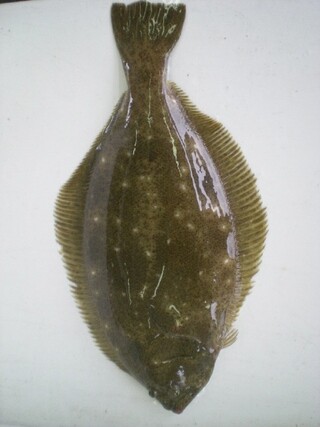hankyoreh
Links to other country sites 다른 나라 사이트 링크
Japan intensifies health inspections for S. Korean flounder imports

The Japanese government announced intensified hygiene inspections for South Korean flounder. While Tokyo claimed the decision was unrelated to its recent defeat in its case against South Korea before the World Trade Organization (WTO), analysts are interpreting the move as amounting to retaliation.
On May 30, the Japanese Ministry of Health, Labour and Welfare (MHLW) announced that it would be substantially intensifying inspections of South Korean seafood as of June 1 in order to “establish hygiene measures for South Korean flounder.” The ministry explained that it would be doubling the inspection rate for South Korean flounder from 20% to 40% as of next month, citing the detection of the parasite Kudoa – which causes vomiting and diarrhea – in flounder imported from South Korea. Japan imported 2,069 tons of South Korean flounder in 2017.
On its reason for targeting South Korean flounder for intensified inspections, MHLW explained, “Due to the occurrence of food poisoning caused by the parasite Kudoa, we are intensifying inspections in June, when South Korean flounder imports increase.” It also produced data showing five instances of food poisoning in 2015 and seven in 2018 that occurred in Japan as a result of South Korean flounder.
The ministry also announced it would be doubling the Vibrio parahaemolyticus inspection rate for refrigerated blood clams, pen shells, common cockles, and sea urchins from 10% to 20% for all countries. V. parahaemolyticus is a bacterium responsible for food poisoning.
MHLW insisted that it had “not imposed countermeasures against South Korea because of the WTO appeal defeat.” Japanese Chief Cabinet Secretary Yoshihide Suga said, “My understanding is that this measure was undertaken in the interest of protecting the public’s health.”
But even in Japan, observers saw the decision as connected with the WTO defeat. The Sankei Shimbun newspaper noted that it was “highly unusual to intensify importation regulations for a particular country’s seafood,” concluding that the move was “effectively a countermeasure in response to South Korea’s restrictions on imports of seafood produced in eight prefectures, including Fukushima, in the wake of the 2011 Fukushima Nuclear Power Plant accident.”
In 2015, the Japanese government lodged a complaint with the WTO contending that the South Korean ban on seafood imports from Fukushima and seven other prefectures was “unfair.” While it was successful in the first hearing on the case, it was ultimately defeated in an appeal decision last month.
By Cho Ki-weon, Tokyo correspondent
Please direct comments or questions to [english@hani.co.kr]

Editorial・opinion
![[Guest essay] The real reason Korea’s new right wants to dub Rhee a founding father [Guest essay] The real reason Korea’s new right wants to dub Rhee a founding father](https://flexible.img.hani.co.kr/flexible/normal/500/300/imgdb/original/2024/0423/8317138574257878.jpg) [Guest essay] The real reason Korea’s new right wants to dub Rhee a founding father
[Guest essay] The real reason Korea’s new right wants to dub Rhee a founding father![[Column] ‘Choson’: Is it time we start referring to N. Korea in its own terms? [Column] ‘Choson’: Is it time we start referring to N. Korea in its own terms?](https://flexible.img.hani.co.kr/flexible/normal/500/300/imgdb/original/2024/0423/3617138579390322.jpg) [Column] ‘Choson’: Is it time we start referring to N. Korea in its own terms?
[Column] ‘Choson’: Is it time we start referring to N. Korea in its own terms?- [Editorial] Japan’s rewriting of history with Korea has gone too far
- [Column] The president’s questionable capacity for dialogue
- [Column] Are chaebol firms just pizza pies for families to divvy up as they please?
- [Column] Has Korea, too, crossed the Rubicon on China?
- [Correspondent’s column] In Japan’s alliance with US, echoes of its past alliances with UK
- [Editorial] Does Yoon think the Korean public is wrong?
- [Editorial] As it bolsters its alliance with US, Japan must be accountable for past
- [Guest essay] Amending the Constitution is Yoon’s key to leaving office in public’s good graces
Most viewed articles
- 1[Column] ‘Choson’: Is it time we start referring to N. Korea in its own terms?
- 2Senior doctors cut hours, prepare to resign as government refuses to scrap medical reform plan
- 3[Guest essay] The real reason Korea’s new right wants to dub Rhee a founding father
- 4Why Korea shouldn’t welcome Japan’s newly beefed up defense cooperation with US
- 5Opposition calls Yoon’s chief of staff appointment a ‘slap in the face’
- 6New AI-based translation tools make their way into everyday life in Korea
- 7Terry Anderson, AP reporter who informed world of massacre in Gwangju, dies at 76
- 8[Column] The clock is ticking for Korea’s first lady
- 9Samsung barricades office as unionized workers strike for better conditions
- 10Korean government’s compromise plan for medical reform swiftly rejected by doctors